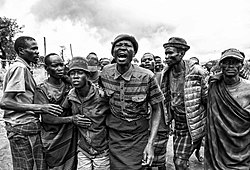
Back Ik (Ethnie) German Ikoj Esperanto Pueblo kuliak Spanish Ik (peuple) French Ik (popolo) Italian Ik (Volk) NDS Waik Swahili
This article needs additional citations for verification. (July 2023) |

The Ik people are an ethnic group or tribe native to northeastern Uganda, near the Kenyan border. Primarily subsistence farmers, most Ik live in small clan villages, or odoks, in the area surrounding Mount Morungole in the Kaabong district. Their population is estimated between 10,000 and 15,000.[1]
The word Ik means "head of migration"; they are traditionally believed by locals to have been some of the regions earliest settlers from Kenya.[2] In 1972, they were the subject of anthropologist Colin Turnbull's highly contested book The Mountain People, which described them as traditionally nomadic hunter-gatherers. According to Turnbull, the Ik transitioned to farming in the mid-20th century due to extensive raiding from neighboring groups, as well as the creation of nature preserves on their historical range.[3]
In 1985, linguist Bernd Heine disputed Turnbull's claims. His analysis of the Ik language and traditional holidays found numerous references to agriculture, suggesting that they are historical farmers who hunted and foraged supplementarily. This was backed up by accounts from elders, who denied any known history of a nomadic lifestyle.[4]
The Ik language is a member of the Kuliak sub-group of Nilo-Saharan languages. Notable traditions include itówé-és ("blessing the seeds"), a three-day festival that marks the beginning of the agricultural year, and ipéyé-és, a coming-of-age ritual in which young men must cleanly slaughter a male goat with a spear. The Ik are predominantly Christian.[4]
The Ik, along with various other Ugandan tribes, have been subject to forced eviction from their ancestral lands without compensation.[5] They continue to face numerous challenges due to their small population and isolation. The road system in rural Kaabong is poor, and access to education and health services is scarce: in 2016, only one Ik student completed their O-levels.[6] In 2016, Hillary Lokwang became the first member of the tribe to be elected to parliament; however, they continue to be politically marginalized. Due to their reliance on agriculture, they are vulnerable to drought and famine.[7] The tribe is considered endangered by some.[8]
- ^ polly (2019-05-15). "the ik tribe - uganda tribes and culture, tribes near kidepo". Kidepo Valley National Park. Retrieved 2024-02-12.
- ^ Musasizi, Simon (2013-10-08). "Meet the Ik, Karamoja's original tribe on verge of extinction". The Observer - Uganda. Retrieved 2023-07-07.
- ^ "Visiting the Ik Tribe - The Mountain People of Uganda". Kabiza Wilderness Safaris. 2023-12-29. Retrieved 2024-02-12.
- ^ a b Cite error: The named reference
:0was invoked but never defined (see the help page). - ^ "Uganda - IWGIA - International Work Group for Indigenous Affairs". www.iwgia.org. Retrieved 2023-07-07.
- ^ Independent, The (2020-08-28). "Education frustrates parliamentary hopefuls among Ik community". The Independent Uganda. Retrieved 2023-07-07.
- ^ "Ik/Teus of Uganda". Pray Africa. Retrieved 2023-07-09.
- ^ "Uganda: Endangered tribe puts hope in rookie lawmaker". www.aa.com.tr. Retrieved 2023-07-07.
© MMXXIII Rich X Search. We shall prevail. All rights reserved. Rich X Search